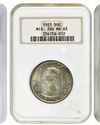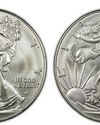
The catalog of Canadian coins goes back to the 1850s, with trade tokens, colonial pieces and provincial coinage stretching back further.
Much of the land now known as Canada was claimed by France in 1535 and started off as the colony of New France. The demand for beaver pelts in Europe drove much of the interest in exploring and colonizing the vast wilderness of upper North America over the next three centuries. Some of the major fur trade companies even issued tokens worth the value of a beaver pelt (or fractions thereof) and these pieces circulated among other types of privately issued tokens as well as legal-tender coinage from other countries well into the 19th century.
Britain claimed the colony of Canada in 1763 and Canada's confederation came in 1867, when the colonies of New Brunswick, Nova Scotia, Quebec and Ontario joined to become the Dominion of Canada. As the nation grew, so did its need for coinage, which was originally produced for Canada by the Royal Mint in London, with some coins also being produced at the private Heaton Mint in Birmingham, England.
Britain struck Canada's coins for a half century, from the time the first one-cent coins for circulation in 1858 until the opening of the Royal Canadian Mint in Ottawa in 1908.
By that point, the general cadence of Canada's coinage was well established, and it largely resembled the type of coinage system that had long before been adopted by the United States.
EXPLORING CANADA'S COINS
When the Mint in Ottawa went online, Canada was producing one-cent, five-cent, 10-cent, 25-cent and 50-cent coins. Silver dollars were authorized by the Dominion of Canada Currency Act of 1910, though only two pattern dollars were emitted the following year. Official production of circulating dollar coins didn't begin until 1935.
This story is from the {{IssueName}} edition of {{MagazineName}}.
Start your 7-day Magzter GOLD free trial to access thousands of curated premium stories, and 9,000+ magazines and newspapers.
Already a subscriber ? Sign In
This story is from the {{IssueName}} edition of {{MagazineName}}.
Start your 7-day Magzter GOLD free trial to access thousands of curated premium stories, and 9,000+ magazines and newspapers.
Already a subscriber? Sign In

Top 6 Most Popular U.S. Commemorative Coins
During a half-century of researching U.S.commemorative coinage, I have found that these are the top six U.S. commemorative coins favored by collectors, dealers and investors.

GUIDE TO GRADING SILVER AMERICAN EAGLE ONE-OUNCE BULLION COINS
CAC'S MODERN COIN MINT STATE GRADING STANDARDS

TOP Jen U.S. Gold Coins
LIST OF STRONG PRICES AT SPECTACULAR AUCTIONS

$7,500 GOLD BY THE END OF THE DECADE?
\"Gold can easily triple by the end of 2030,\" declares Maurice H. Rosen, the prominent Plainview, New York, gold coin prognosticator and award-winning writer.

PCGS Coin Grading 101
In 1986, the numismatic world changed when Professional Coin Grading Service (PCGS) entered the scene as a third-party certification service to authenticate, grade and encapsulate coins at scale.

HOW TO USE THE COIN VALUES LIST
Coin values are provided beginning with small cents through Double Eagle gold pieces and beyond, and many of the popular modern coins in between, all based on The Insider's Guide to U.S. Coin Values, 21st Edition, by Scott A. Travers (www.usgoldexpert.com) and updated for accuracy.

THEINSIDER'S GUIDE TO U.S. COIN VALUES 23RD EDITION
ULTIMATE LIST OF COIN PRICES

Coin Dealers Attacked, Targets of Organized Crime
Coin dealers nationwide have become the latest victims of organized crime, facing targeted attacks following their attendance at coin shows.

Should You be Paying Sales Tax on Your Bullion and Coin Purchases?
THERE ARE MANY IMPORTANT EXCEPTIONS AND EXEMPTIONS

Physical Format Bitcoin Gains Collector Acceptance
PRICE RECORDS CONFIRM MARKET DEMAND